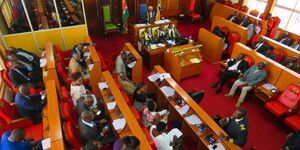Tuberculosis is one of the leading infectious disease killers in the world, with statistics showing that at least 350 people are infected every day in Kenya, resulting in 3 deaths per hour.
In an analysis conducted by the World Health Organisation (WHO) in 2022, 128,000 cases of tuberculosis were reported in the country with a total of 25,900 mortalities recorded within that year.
Chief National Coordinator in the Stop TB Partnership Evaline Kibuchi, who was among the Top 100 Kenyans in 2023 is on the frontline in the fight and prevention of Tuberculosis in the country.
Speaking during an interview with Kenyans.co.ke, Kibuchi highlighted various ways through which her organisation is working towards creating awareness around major life-changing side effects caused by TB, and ways to prevent further spread.
In her activism, Kibuchi has constantly advocated for the consolidation of resources to help scientists come up with a safe, effective, affordable TB vaccine to eradicate the disease by 2030.
Her journey in the fight to solve the TB crisis in the country has spanned over 15 years, through which she has mentored several other younger advocates.
Kibuchi's interesting approach towards mentorship involves engaging former TB patients who have experienced firsthand the effects of the highly communicable disease.
“I work with former TB patients, and we train them to use their experience for advocacy around tuberculosis and helping people infected to adhere to their treatments,” Kibuchi stated.
While speaking to Kenyans.co.ke, Kibuchi also highlighted the need to prevent TB rather than treat it as only 41% of the money used in managing the disease is provided by the government, while the other 59% is from private donors.
“Counties hardly allocate money for TB, therefore so many interventions go without adequate attention due to lack of funds,” she stated.
The biggest challenge in curbing and treating tuberculosis in Kenya is a lack of self-awareness seen by how most infected patients confuse it with other diseases such as pneumonia.
“People get infected and ignore thinking it is pneumonia, they make ginger and lemon treatments or self-medicate over the counter,” she noted
A testament to the adverse effects of the disease are some of the activists within Kibuchi's program. Joseph, a Meru-based TB advocate, is now permanently deaf, as a side effect of the treatment.
Another advocate within the program is Sharon a Kajiado-based activist under the Stop TB Partnership. Sharon continues to deal with incontinence, a condition which is the lack of voluntary control over urination or defecation, brought about by TB medication side effects.
However, Kibuchi is hopeful about the future and looks forward to better times for the country in dealing with the disease.
“I look forward to an advanced political commitment, where even the president will one day stand on a podium and say TB is a problem in my country, and I plan to end the problem,” Kibuchi added.
Some of the innovations dedicated to curbing the disease include TB ATMs, which allow individuals to self-screen. The other involves screening patients visiting the hospital for any other checkups other than TB.
Watch Kenyans.co.ke's full interview with Kibuchi on our YouTube channel.












